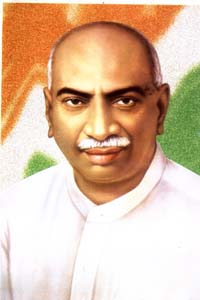Kumarasami Kamaraj
by Rameshraj[ Edit ] 2010-01-05 10:32:31
Kumarasami Kamaraj

Kumarasami Kamaraj (Tamil: �ாமரா��) better known as K. Kamaraj (15 July 1903 � 2 October 1975) was an Indian politician from Tamil Nadu widely acknowledged as the "Kingmaker" in Indian politics during the 1960s. He was the chief minister of Tamil Nadu during 1954-1963 and a Member of Parliament during 1952-1954 and 1967-1975. He was known for his simplicity and integrity.
He was involved in the Indian independence movement. As a high ranking office bearer of the Indian National Congress, he was instrumental in bringing to power two Prime Ministers, Lal Bahadur Shastri in 1964 and Indira Gandhi in 1966. In Tamil Nadu, his home state, he is still remembered for bringing school education to millions of the rural poor by introducing free education and the free Mid-day Meal Scheme during his tenure as chief minister. He was awarded India's highest civilian honour, the Bharat Ratna, posthumously in 1976. The domestic terminal of the Chennai airport is named "Kamaraj Terminal" in his honour and the Madurai Kamaraj University has been renamed after him.
Kamaraj joined as an apprentice in his maternal uncle Karuppiah's cloth shop after dropping out of school. He would slip out from the shop to join processions and attend public meetings addressed by orators like Dr. Varadarajulu Naidu. His relatives frowned upon Kamaraj 's budding interest in politics. They sent him to Thiruvananthapuram to work at another uncle's timer shop.
At the age of 16, Kamaraj enrolled himself as full-time worker of the Congress Party. He invited speakers, organized meetings and collected funds for the party. He also participated in the march to Vedaranyam led by C. Rajagopalachari as part of the Salt Satyagraha of March 1930.
Kamaraj was arrested and sent to Alipore Jail in Calcutta for two years. He was 27 at the time of his arrest and was released in 1931 following the Gandhi-Irwin Pact. Kamaraj was implicated in the Virudhunagar bomb case two years later. Dr. Varadarajulu Naidu and George Joseph argued on Kamaraj's behalf and proved the charges to be baseless. Kamaraj was arrested again in 1940 and sent to Vellore Central Prison while he was on his way to Wardha to get Gandhiji's approval for a list of satyagrahis.
While still in jail, Kamaraj was elected Chairman of the Municipal Council of Viruthunagar. Nine months later, upon his release, Kamaraj went straight to the Municipality and tendered his resignation from his post. He felt that "one should not accept any post to which one could not do full justice."
Kamaraj was arrested once more in 1942 and sentenced to three years in the Amaravathi prison for spreading propaganda material for the Quit India movement initiated by Gandhiji. While in prison, Kamaraj read books and continued his self-education.
